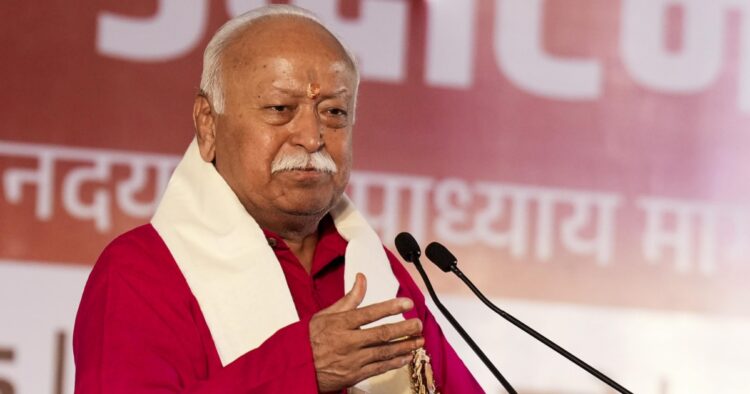KEY POINTS
- Bhagwat stresses non-violence but supports punishing evil for protection.
- He uses Ravan’s story to explain necessary action for reform.
- He condemns Pahalgam attack, emphasizing national strength.
In a recent statement that followed the tragic Pahalgam terror attacks, in which 28 people lost their lives, Rashtriya Swayamsevak Sangh (RSS) chief Mohan Bhagwat highlighted the complex relationship between non-violence and the need to take action against those who commit acts of evil. Speaking at an event in New Delhi to mark the release of the book The Hindu Manifesto, Bhagwat addressed the importance of non-violence in India’s culture while also stressing that sometimes, the best way to deal with evil forces is through decisive action.
Non-Violence as India’s Core Value
Mohan Bhagwat began his speech by reaffirming that non-violence, or ahimsa, is at the heart of India’s cultural and spiritual values. He noted that this principle is deeply ingrained in Indian philosophy, with the teachings of the Bhagavad Gita serving as a guiding light for many. According to Bhagwat, non-violence is not just about avoiding physical harm to others; it is also about ensuring the welfare of people and society. However, he also pointed out that non-violence does not mean standing by when evil forces harm others.
#WATCH | Delhi: RSS chief Mohan Bhagwat says, "…Non-violence is our nature, our value… But some people will not change, no matter what you do, they will keep troubling the world, so what to do about it? … Non-violence is our religion. Teaching a lesson to hooligans is also… pic.twitter.com/Kr9aRMBCy4
— ANI (@ANI) April 26, 2025
He explained that, just like in the Bhagavad Gita, where Lord Krishna instructs Arjuna to fight against forces of unrighteousness, there are times when a strong response is necessary. Bhagwat emphasized that if someone is bent on causing harm and spreading disorder, it becomes necessary to protect the good and punish the evil.
Bhagwat drew an analogy from Hindu mythology, specifically the story of Ravan, to further elaborate on his point. He explained that despite being a devout follower of Lord Shiva and a knowledgeable ruler, Ravan’s character became corrupt due to his actions and decisions. Bhagwat noted that Ravan had all the qualities required to be a good person, but his evil ways overshadowed them.
He continued by stating that Ravan’s destruction was not an act of violence but was necessary for his own spiritual transformation. Bhagwat explained that in Hindu thought, the ultimate purpose of such actions is not to harm but to correct and reform. The killing of Ravan, Bhagwat argued, was an act of non-violence because it was for his own good. This, he stated, is an essential part of the moral and spiritual framework of India.
Mohan Bhagwat then moved on to the concept of punishment in Indian culture. He made a stark distinction between the Indian view on punishment and the Western approach. According to him, the Western idea that all punishment must be uniform and absolute is flawed. In Indian thought, punishment is tailored based on the nature and actions of the individual.
He argued that while non-violence is an important value, it is equally important not to let oppressors and criminals go unchecked. Bhagwat suggested that the role of the king or leader is to protect the people, which sometimes involves punishing the wrongdoers in a manner that serves as a lesson. He said that India recognizes that some people can be reformed, while others cannot. For those who cannot be reformed, he argued, it may be necessary to take decisive action.
Bhagwat also commented on the recent Pahalgam terror attacks, where militants targeted and killed people based on their religious identity. He condemned the fanatical behavior of those behind the attack, asserting that such actions are contrary to the values of India. Bhagwat highlighted that, unlike the terrorists, Hindus would never engage in such violence based on religion, pointing out that the principles of non-violence and respect for all life are deeply rooted in Hinduism.
He warned that the country must remain strong to prevent such attacks and ensure that it is protected from those who seek to harm innocent people. Bhagwat’s message was clear: while India values peace and non-violence, it will also stand firm against any force that seeks to disrupt the harmony and safety of its people.
Earlier in Mumbai, Bhagwat had referred to the ongoing conflict as a battle between dharma (righteousness) and adharma (unrighteousness), rather than merely a religious or sectarian dispute. He explained that India’s fight is not just about different religious groups but about standing up for righteousness and justice. According to Bhagwat, the values of dharma are what will ultimately guide the nation through difficult times and ensure that justice is served, regardless of the nature of the enemy.
In his speech, RSS chief Mohan Bhagwat reinforced the importance of non-violence as a core principle of India’s cultural heritage. However, he also acknowledged that there are times when taking strong, decisive action is necessary to protect the nation and its people. His comments on the Pahalgam terror attack and the broader fight between dharma and adharma reflect his belief in a balanced approach, one that combines the compassion of non-violence with the resolve to confront evil when necessary. In Bhagwat’s view, this is what defines India’s unique path towards peace and justice.

















Comments